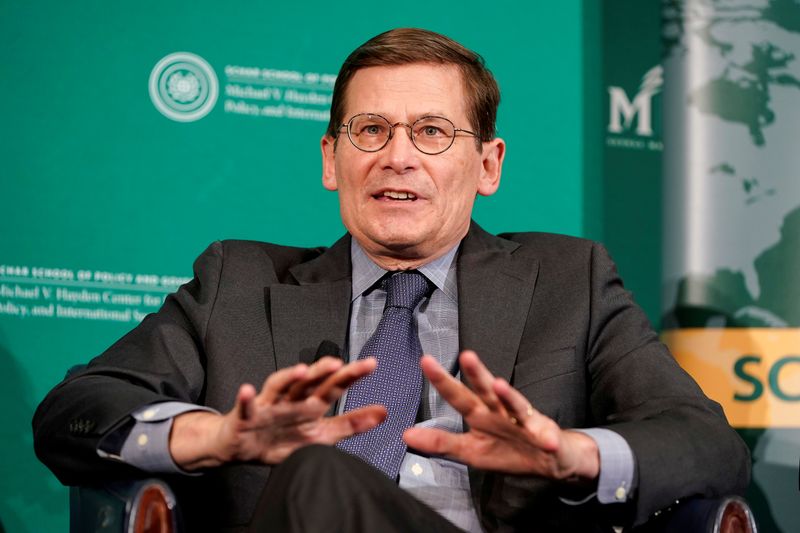By Jonathan Landay and Mark Hosenball
WASHINGTON (Reuters) - Shortly after comparing U.S. intelligence agencies to Nazis, Donald Trump tried to mend fences on his first full day as president.
On Jan. 21, 2017, standing before a marble wall at CIA headquarters honoring officers who died in service, Trump pledged "so much backing" before delivering a campaign-style speech inflating his inauguration attendance and attacking the "dishonest media."
His use of the memorial as a prop marked the start of a stormy relationship with his spy services in which Trump denigrated their leaders, rejected their findings, appointed loyalists to replace top officials who disagreed with him and condoned using government secrets to attack political opponents.
Now, President-elect Joe Biden and his picks to lead the spy agencies must fix the damage: rebuilding both trust and morale within the agencies and their relations with Congress and the White House, said current and former U.S. officials.
"The problems we have with intelligence were a function of Donald Trump's demands that the intelligence serves his political interests," said Peter Welch, a Democrat on the House of Representatives' intelligence committee.
The White House did not respond to a request for comment.
Top Republican senators on Thursday called for Biden to begin receiving intelligence briefings, but Trump's refusal to concede defeat is holding up that transition practice.
If the delay lasts more than a month, "then we have to worry" about the impact on national security, said Lawrence Pfeiffer, chief of staff to former CIA Director Michael Hayden. Biden has years of experience working with the intelligence agencies as vice president to President Barack Obama and as a Senate Foreign Relations Committee member and chairman.
Officials and experts recommend Biden tap as his intelligence chiefs veterans with standing in the community. Sources told Reuters that former CIA Deputy Director Michael Morell is a leading contender to replace CIA chief Gina Haspel or John Ratcliffe as director of national intelligence, the overseer of the 17 U.S. agencies.
Biden, they said, should visit those organizations in his first week to address the workforces.
Marc Polymeropoulos, a former undercover CIA officer, said Biden should tell them: "'I have faith in the intelligence community. There is no deep state, period. We value what you do.’"
WATCHDOGS AND WHISTLEBLOWERS
Another step would be restoring internal watchdog and whistleblower programs that Trump and his allies upended, said Mike Quigley, another Democrat on the House intelligence committee. "That would give a boost to morale."
And by reaffirming support for NATO and other alliances that Trump has shaken, Biden would reassure allies that intelligence they share would not be misused, he said.
Finally, Biden should let it be known that he will take the daily intelligence briefing that Trump disdained, Quigley said.
Biden's transition team declined to discuss his spy agency plans.
Trump frequently clashed with his agencies, including publicly accepting Russian President Vladimir Putin's assertion that Moscow did not interfere in the 2016 election to help Trump, contradicting a U.S. intelligence finding.
By this year, he had replaced key intelligence officials with loyalists, including Ratcliffe, a former congressman who defended Trump during his impeachment.
As the Nov. 3 election neared, Ratcliffe faced charges by Democrats and former intelligence officials of politicizing intelligence after releasing to a Republican senator probing Biden's son Russian intelligence that was unverified and possibly fabricated.
Democratic and Republican intelligence sources said Ratcliffe has spent much of his stint selectively declassifying material helpful to Trump’s re-election, provoking fears he may have exposed the means by which U.S. spies collect information.
Some officials fear Ratcliffe and other Trump appointees may release more politically-skewed material.
The CIA has been resisting pressure, congressional and intelligence sources said, to declassify a Republican congressional memo that used ultra-secret materials to argue that Russia favored Hillary Clinton - rather than Trump - in the 2016 election.
Asked to respond to the politicization allegations, Ratcliffe's office pointed to a spokeswoman's Oct. 17 statement that said: "Those who are being critical of his declassification decisions don’t have visibility into these documents or the stringent process ODNI uses to protect sources and methods.”
As for Haspel, a White House adviser said Trump has made clear to aides that he has considered firing the first female CIA chief, who earned his wrath for disputing his views on North Korea.
Biden and his intelligence chiefs face a harder time regaining trust among the more than 70 million Americans who voted for Trump, current and former officials say.

"It will be difficult returning intelligence to its proper under-the-radar role at a time when many on Capitol Hill and in the country believe it has been politicized, either by or against the Trump administration," said Thomas Fingar, a former chief U.S. intelligence analyst.